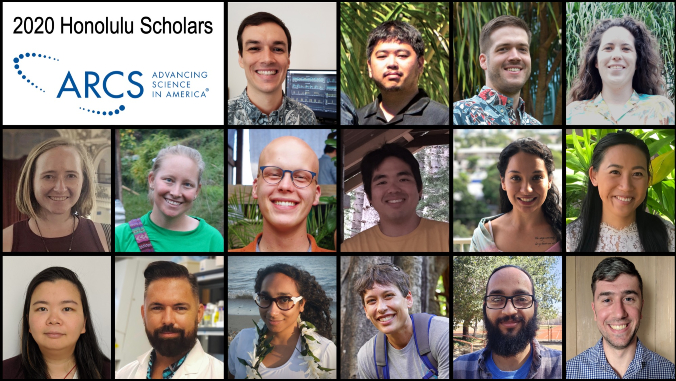
Sixteen University of Hawaiʻi at Mānoa doctoral candidates have been awarded $5,000 Scholar Awards from the ARCS Foundation–Honolulu Chapter. The 2020 awards were made in six UH Mānoa units.
ARCS Foundation works to advance science in America by providing unrestricted awards to outstanding U.S. graduate students in STEM fields. The chapter has provided more than $2 million to UH graduate students since 1974.
“This award has not only provided monetary support for my research, but it shows that there’s recognition for my work outside of my immediate sphere, and that’s very meaningful,” says ARCS Scholar Trista A. McKenzie.
McKenzie and her award donor are featured in the Honolulu Chapter’s first Meet-the-Scholar video, which was created after COVID-19 preempted the annual scholar presentations.
College of Engineering scholars
Douglas Ellman received the Bretzlaff Foundation Award in Engineering. He uses optimization and machine learning to study how distributed energy resources, such as solar batteries, electric vehicles and smart appliances, can be used to improve the operation of the electric grid.
Brenden M. Minei received the Frederick M. Kresser Award in Engineering. He developed a novel ceramic-based Nano-Paste that can be both 3D printed and molded to optimize and develop ceramic nanocomposite parts with armor as well as space structure and optical applications.
Read more about the College of Engineering scholars.
College of Natural Sciences scholars
Luke Campillo received the Sarah Ann Martin Award in Natural Sciences. He sequences the DNA Hawaiian birds to study the impact of limited contact with other populations and competition for limited resources on speciation on island archipelagos.
Allexa Dow received the Ellen M. Koenig ARCS Award. She studies mechanisms employed by the deadly Mycobacterium tuberculosis pathogen to survive severe zinc depletion in the host, a necessary step for disease transmission.
Marisa S. McDonald received the Maybelle Roth ARCS Award in Conservation Biology. She is working to understand vision in larval mantis shrimp, focusing on ultraviolet vision function and use.
Ashley A. McGuigan received the ARCS Honolulu Award. She explores the connection between agroforest biodiversity and dietary nutrition in Fiji and the ways agroforestry helps people recover from major cyclone disturbances.
John “Jack” Runburg received the Sarah Ann Martin Award in Natural Sciences. He uses theoretical models and devises other methods to learn more about dark matter, the most common, but invisible, form of matter in the universe.
Read more about the College of Natural Sciences scholars.
College of Tropical Agriculture and Human Resources scholars
Michael David Honda received the Kai Bowden ARCS Award. He is working to determine the mechanism of iron uptake in giant leucaena, which is used as a nutritious fodder-legume for farm animals.
Priscilla S. Seabourn received the Helen Jones Farrar Award. She uses DNA sequencing to characterize the microbiome and understand how environmental and ecological factors influence its diversity in Aedes albopictus mosquitoes, an insect that serves as a vector for Dengue and Chikungunya viruses, with an eye to improving strategies for disease prevention.
Read more about the CTAHR scholars.
John A. Burns School of Medicine scholars
Lauren Ching received the Koenig ARCS Award. She studies immunopathogenesis of Kawasaki disease, the leading cause of pediatric acquired heart disease in the developed world, to identify novel therapeutics that could ameliorate changes to coronary arteries.
Aileen S.W. Li received the Starbuck ARCS Award in Medicine. She uses in vitro model systems to understand the mechanisms of gastrulation, the foremost, crucial and sensitive stage of embryo development, and exposure to teratogens, agents that can cause birth defects.
Brien Haun received the Ellen M. Koenig ARCS Award. He is working to hack the immune system to uncover protective responses to emerging infectious viruses.
Read more about the JABSOM scholars.
School of Ocean and Earth Science and Technology scholars
Anamica Bedi de Silva received the George and Mona Elmore ARCS Award. She works on viral immunity in microbes, developing resistant strains of a single-cell algae for experimental evolution in the laboratory to determine if there are fitness costs to viral resistance.
Trista A. McKenzie received the Toby Lee ARCS Award in Earth Sciences. She studies groundwater pollution and discharge dynamics using a combination of field, lab and machine-learning approaches.
Read more about the SOEST scholars.
Institute for Astronomy scholars
Gagandeep “Deep” Anand received the ARCS Honolulu Award. He is determining accurate distances to nearby galaxies using Hubble Space Telescope imaging to investigate the distribution of matter and evolution of galaxy groups and clusters.
Travis A. Berger received the Columbia Communications Award in Astronomy. He studies planet formation and evolution using stellar distances as measured by the Gaia space observatory of stars and exoplanets observed by the Kepler space telescope.

